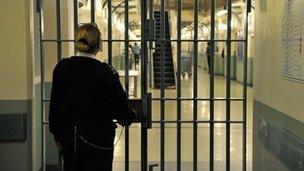Legal aid: Government consults on £220m savings plan
- Published

Prisoners would be denied legal aid unless the case related to their sentence
A consultation on plans to save £220m from the criminal legal aid bill has been launched.
Proposals include stopping defendants with a disposable income of more than £37,500 from automatically receiving legal aid and curbing prisoners' right to legal aid.
The consultation also paves the way for lawyers to compete for contracts.
The Law Society, representing solicitors in England and Wales, said that could be "catastrophic".
The Ministry of Justice (MoJ) consultation document sets out key areas for savings in the next phase of legal aid reforms.
Last month, Justice Secretary Chris Grayling said criminal defence represented "by far the largest element of our remaining legal aid spend, where we are still spending over £1bn a year".
BBC legal correspondent Clive Coleman said the government wanted to introduce price competitive tendering, where providers bid for legal aid contacts. It would like to see fewer contracts with legal aid providers.
He said there were currently more than 1,600 organisations providing legally aided services.
Tendering for contracts would be opened in autumn 2013 and the first contracts would be in place in autumn 2014.
But the Law Society said it was "implausible that tendering will save the sort of sums of money the Treasury is looking for and there is some doubt whether it will save anything at all".
'Huge, huge risk'
The president of the Law Society, Lucy Scott-Moncrieff, told BBC Radio 4's Today programme that introducing price competition was "going to require a huge reshaping of the way justice is delivered in this country."
She said it was unrealistic for the government to do in the timescale it has proposed.
"It will take much longer to do properly, and if it's not done properly then we are going to end up with miscarriages of justice, with people being stuck in prison far longer than they should be on remand, with witnesses not turning up, with cases not being properly prepared," she said.
"It's a huge, huge risk."
The government, though, disputed the argument that the changes would come too quickly. A spokeswoman for the MOJ said the legal sector has been on notice since 2010 about competition and informal discussions have been ongoing since last summer.
The Bar Council, which represents barristers in England and Wales, has warned that "a model based on price competition is a blunt instrument".
"It assures none of the safeguards and qualities which we must expect from our justice system," chairman Maura McGowan QC said.
"Decisions on allocation of work must be made on quality and not on money alone."
A spokeswoman said the government will continue to uphold everyone's right to a fair trial, but "at a time when businesses across the country have to adapt to a very difficult climate the legal sector cannot be immune".
Other plans being consulted on include denying prisoners legal aid unless the case relates to their sentence.
Mr Grayling has said taxpayers' money is being used for "unnecessary legal cases" that could be dealt with by the prison service.
The move would cover issues such as the category of prison or which section of a prison an inmate was being held in and levels of visits and correspondence.
The MoJ says the proposals, criticised by prison campaigners as "profoundly unfair" and "negative", would mean 11,000 fewer cases and save £4m a year.
The consultation also include plans to tighten rules allowing recent immigrants access to legal aid.
Ms Scott-Moncrieff said she was concerned about a potential blanket ban on all recent immigrants being denied legal aid.
She said: "Justice shouldn't depend on your status in the country, it should depend on your need."
Fees paid to lawyers in long and complex criminal trials would be cut, as part of the plans.
At the moment, such trials account for a small percentage of overall cases, but incur a disproportionate cost.
The consultation comes after changes to the Legal Aid, Sentencing and Punishment of Offenders Act which were introduced in England and Wales last week.
Public funding was removed from entire areas of civil law, including some family cases, in a bid to cut £350m from the £2.2bn legal aid bill.
Some law firms have predicted those changes will reduce the number of people who qualify for legal aid by 75% - which would mean about 200,000 fewer cases.
Meanwhile, the MoJ has said it is developing plans for criminals to be charged for the cost and running of the court process, with payments deducted from their future earnings.
"Those who live outside the law should pay the consequences both through being punished and bearing more of the costs they impose on society," Mr Grayling said.
"That is why we are exploring ways to make criminals pay towards the cost of their prosecution to the court."
- Published6 April 2013
- Published4 April 2013
- Published1 April 2013
- Published5 March 2013
- Published20 March 2013
- Published5 March 2013